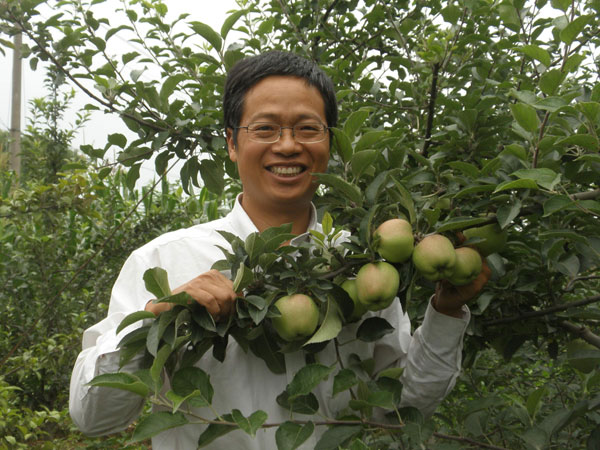Dirty toilets and human waste are topics most people stay away from. But one man in Tianshui, Gansu province, is proud to be associated with them. Shi Yingying finds out.
It was the most revolting experience. The sight and stench of school toilets in Tianshui, Gansu province, was so disgusting that a visitor two years ago, threw up on the spot. But today, the toilets are not only clean, they are also eco-friendly, and no water is needed to flush the waste. Urine from the toilets is recycled as fertilizer for organic apples - a cost-saving initiative, which has brought smiles to farmers.
The man behind the initiative is Chen Xiangyang, 43, who visited the town on a charity tour two years ago with a native of Tianshui - Pan Shiyi, chairman of Soho China. After the visit, Chen stayed in Tianshui to help Pan "give back to the community".
 |
|
Chen Xiangyang introduces human waste as fertilizer to local fruit growers. Provided to China Daily |
Pan, who is one of the country's most successful real estate developers and philanthropists, attempted to provide 15 flush toilets for schools in the town but found that because of the expensive water rates and a water shortage they couldn't be used.
Chen says growing up in mountainous Hubei province, where people can drink directly from clean ponds, inspired him to improve China's water quality - which in places is heavily polluted.
He says realizing the shortage of the water supply in Tianshui, he knew that building new, flush toilets, was not a solution.
"The schools simply couldn't afford the expensive water rates," says Chen, who majored in English at college and was once a middle school teacher in his hometown of Hubei province, before joining the lighting industry.
Although he didn't originally think of himself as an environmentalist, he recalls seeing a Swedish eco-friendly toilet design in 1993. The encounter changed his life and Chen became a middleman selling the eco-friendly brand.
However, he did not have many buyers and had almost given up on the idea when he met up with Pan, who was soliciting ideas for his toilet charity program in Tianshui.
"I recommended the waterless toilet system to Pan," he says.
At first, Pan was not convinced.
"It took him a whole year to see the problems of flush toilets and start thinking about using eco-friendly versions," Chen recalls.
Pan eventually spent nearly 10 million yuan ($1.6 million) on 30 waterless toilets, which is how Chen started his eco-toilet revolution.
How does the waterless toilet work?
According to Mikael Billsund, CEO of Separett Toilet, liquid and solid wastes are routed separately in the waterless toilet to avoid the unpleasant odors because once urine and feces mix together, the combination starts to ferment.
Not only do the waterless toilets solve the smell problem, they provide much-needed fertilizer to farmers.
"Thanks to the process of separation, it is easy and safe to handle the liquid waste as the urine is an excellent natural fertilizer for the garden," says the Swede, who adds that urine is better than feces when it comes to fertilizing the soil as the liquid contains 80 percent nutrient, while excrement contains only 20 percent.
"I am now the busiest nightman in the world," jokes Chen.
In China, a "nightman" carries away human excrement from public toilets.
Chen is responsible for recycling 5,000 kg of waste produced by 20,000 teachers and students from local schools everyday.
Chen started his human waste fertilizer experiment by promising farmer An Weigang that he would purchase all the fruit from An's 24 apple trees.
"I harvested 1,000 kg apples that autumn. It was a little less than my usual annual output, but I saved money on free fertilizer and Chen bought every apple, so there was no risk of unsold apples," An says. "What came as a surprise was, even though the apples did not look as pretty as before, they tasted better and sweeter."
After hearing about An's experience, this year, 14 apple farmers volunteered to venture into organic farming with Chen.
"I'm expecting 100,000 kg to 150,000 kg of apples in the upcoming fall," Chen says.
Chen sells the fruit online. But there have been criticisms that he has priced the fruit too high, to which Chen responds that he has to deliver the fruit by air.
Apart from apples, Chen says he is now experimenting on other fruits and vegetables such as watermelon, cherry, eggplant and potato.
Contact the writer at [email protected].
